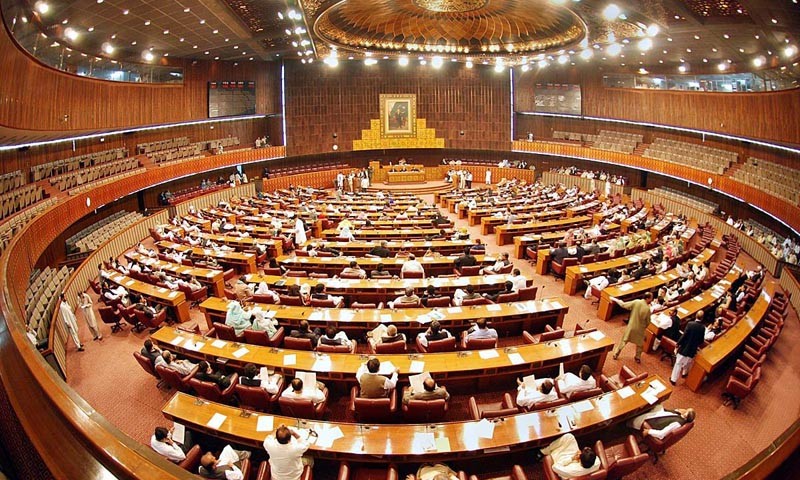
What keeps the parliamentarians away from expressing freely -- self-censorship or a culture of silence?

The continued disappearance of social activists has rekindled a much needed conversation on the space available for freedom of expression and questioning. As a journalist, I can easily confirm that the profession as a habit practices self-censorship as certain subject matters can not only irk the establishment, but you can easily wind up dead as well, as happened with Saleem Shahzad.
With the space for dissent and discussion rapidly decreasing, the parliament becomes a hallowed ground. If we, the people cannot openly express our opinions, then at least, our elected representatives can, safe in the confines of the National Assembly and/or Senate.
"The power of the parliament comes from the fact that you can openly and freely express yourself and question the government," says Nafisa Shah, a senior member of the Pakistan Peoples Party. "Especially the opposition, it has to speak its mind and has to speak openly." Shah argues that while her party has on numerous occasions raised questions and topics of conversation, the ruling PML-N party is not bothered to respond. "Instead, we are sneered at."
Still, a wide array of topics come under discussion, both in the National Assembly and the Senate. And sometimes action is also taken. Shah cites the example of an accident in her constituency in which over 60 people died, and when the issue was raised in parliament and a report demanded, it got the line departments moving. However, sensitive matters, such as blasphemy and religion, military matters, including defense budgets, and relations with neighbours -- India and Afghanistan -- do not get the kind of airtime they deserve. "There’s some level of self-censorship in the parliament along with a culture of silence as well," says Shah. "There’s a limit to the kinds of questions one can ask and the answers one gets."
Where does this self-censorship stem from, and does it not go against the basic principle of what the parliament is about: a forum where everything under the sun can be discussed, without fear of it being used against the person anywhere outside? "An authoritarian grip continues to exist in some form over our civilian governments," says Senator Afrasiab Khattak, from the Awami National Party (ANP). "There is a fear that if one is seen as being anti-establishment, it may cause hurdles to the party or person’s ascent to power -- or worse." However, Khattak believes that this ‘threat’ is more perception than reality.
Still, in a federal parliamentary democracy such as ours, the parliament is supposed to be the pivot around which everything moves. However, according to Khattak, because the culture of a continuous parliamentary democracy has not yet set in, in Pakistan, for most political parties, democracy is only necessary to get them into power. "There is a difference in how political parties treat the parliament," he says. "While the PPP may have had issues of governance, they had greater interaction with the parliament, whereas the PML-N only turns to it in times of crisis."
Read also: Editorial
According to a report released by the Free and Fair Elections Network (FAFEN), out of 289 sittings conducted in 32 sessions between June 2013 and May 2016, the Prime Minister was present a total of 39 times: a paltry 13.5 per cent attendance. However, this is a recurring pattern seen across political parties. Imran Khan from the Pakistan Tehreek-e-Insaaf (PTI) attended 18 sittings, Amir Haider Khan Hoti from the ANP 51, and Dr. Farooq Sattar from the MQM, 56.
Do these across-the-board paltry figures suggest that all of Pakistan’s political parties do not care much for parliament? "Parties (like the PTI) opt out of the parliament because they want to play a role larger than commanded by their numbers, by both votes and seats," says Dr. Mohammad Waseem, Professor at the Department of Humanities and Social Sciences at LUMS. "The government doesn’t participate because it has its authority which is unhampered by not participating in parliament." According to Dr Waseem, the parliament has been reduced to "passing resolutions and sometimes discussing certain policies".
While the constitution of the country ensures that no member of the Majlis-e-Shura can be held liable in any court in respect of anything said or any vote given by him or her, the parliament does not have the power to make policy. And this keeps the politicians away. "Parliamentarians don’t take part in discussions which are a waste of time," says Dr Waseem. "At the same time, they are very sensitive to the thinking of extra-parliamentary forces." So topics like Balochistan and India become no-go areas.
At the same time, according to him, the parliamentarians are both "conscious and sensitive to the street power of the religious lobby" and, thus, cannot pick up issues because of immense pressure from both the "jihadis and other Islamist elements".
On paper, the parliament has all kinds of rights, duties and powers. However, its relevance is extremely low, because both power and policy-making lie outside. "There is immense pressure (on the parliament) from the outside, from the two (extra-parliamentary forces) mentioned," says Dr Waseem. "The Executive and the Army need to concede power to the real power holder in a democratic framework."
If power resides outside of parliament, and with numerous no-go areas of conversation, regardless of any privileges the constitution may accord it, the parliament is free yet empty.